Bodye Surname Ancestry ResultsOur indexes 1000-1999 include entries for the spelling 'bodye'. In the period you have requested, we have the following 7 records (displaying 1 to 7): Buy all | | | Get all 7 records to view, to save and print for £42.00 |
These sample scans are from the original record. You will get scans of the full pages or articles where the surname you searched for has been found. Your web browser may prevent the sample windows from opening; in this case please change your browser settings to allow pop-up windows from this site. Officers of the Royal Household
(1553)
King Edward VI died 6 July 1553 and was buried 8 August following. The accounts of the funeral expenses were prepared by sir Edward Waldegrave, knight, one of queen Mary's privy coucil, and master of her Majesty's great wardrobe. The expenses included the purchase of 'blacke clothe boughte for the buriall' to furnish mourning for every officer and servant of the late king's household, and these accounts list all the officers, department by department, by name. Most officers were provided with 4 yards of cloth, and their clerks and servants 3 yards each: greater dignitaries were allowed from 7 to 16 yards; sir Edward himself received 10. The total cost of the 9,376 and a half yards of cloth was £5946 9s 9d.BODYE. Cost: £6.00.  | Sample scan, click to enlarge
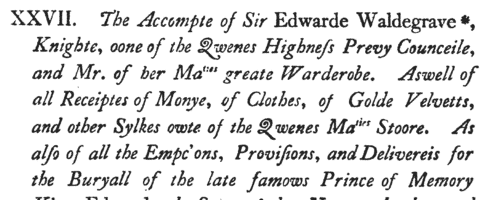
| Common Pleas: Hampshire
(1558)
Pleas at Westminster Michaelmas term, 5 & 6 Philip & Mary and 1 Elizabeth, 1558. The court dealt with civil cases: debt, detinue, slander, assault, theft, breach of covenant, formedon, novel disseisin, &c. Each case is marked in the margin with the name of the county to the sheriff of which the writs were issued. Most often, but not necessarily, this would be the county of residence of the defendant. This calendar of the original formulaic record in abbreviated Latin on parchment has been made by David Bethell, preserving all individual detail from each case. The Latin text is translated: English phrases and passages are preserved literatim, in bold. CP 40/1176 mm.1-100BODYE. Cost: £8.00.  | Sample scan, click to enlarge
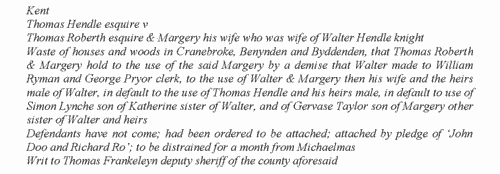
| Hampshire Entries in the Common Pleas (1558)
The Common Roll of the Common Pleas records litigation before the justices de Banco from throughout England.
BODYE. Cost: £8.00.  | Sample scan, click to enlarge
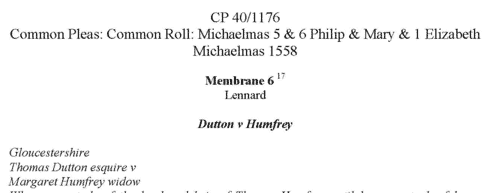
| Militia in Glaston Twelve Hides hundred, Somerset
(1569)
A muster of the ablemen, gunners, light horsemen, pikemen, archers and billmen available from this hundred, compiled by sir Hugh Paulet, sir Maurice Barkeley, sir Ralph Hopton and John Horner in answer to a royal commission of the 11th year of queen Elizabeth. The returns are arranged by tithing. The hundred consisted of the parishes of Baltonsborough, (the borough of) Glastonbury, Meare, North Wootton, Nyland, West Bradley and West Pennard. (The sample shown is from the return for the borough of Axbridge)BODYE. Cost: £6.00.  | Sample scan, click to enlarge
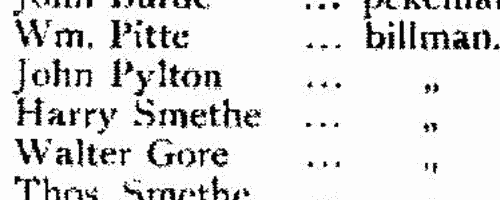
| Militia in Kingsbury hundred, Somerset
(1569)
A muster of the ablemen, gunners, light horsemen, pikemen, archers and billmen available from this hundred, compiled by sir Hugh Paulet, sir Maurice Barkeley, sir Ralph Hopton and John Horner in answer to a royal commission of the 11th year of queen Elizabeth. The returns are arranged by tithing. The hundred consisted of the parishes of Ash Priors, Bishops Lydeard, (the borough of) Chard, Combe St Nicholas, Fitzhead, Huish Episcopi, Kingsbury Episcopi, (the borough of) Wellington, West Buckland, (the market town of) Wiveliscombe, and Winsham. (The sample shown is from the return for the borough of Axbridge)BODYE. Cost: £6.00.  | Sample scan, click to enlarge
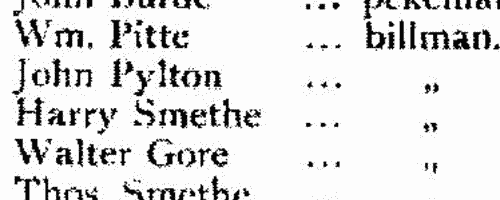
| Merchants and traders in Aberdeen
(1399-1631)
A. M. Munro searched the council registers of the royal burgh of Aberdeen, and compiled this list of burgesses admited to the borough. The entries prior to 1591 were contained in lists engrossed in the council registers at the close of the minutes for the year ending at Michaelmas, but after that date in addition to the annual lists, which are continued, there is almost always a separate minute of admission under the respective dates. The records before 1591 are not only sparser, often with no more than a name, but are also lacking for 1401-1405, 1413-1432, 1434-1435, 1518-1519, 1557 and 1562-1564 - other blanks were filled in from the guildry accounts where such existed. Guild burgesses were allowed unfettered trading rights in Aberdeen; simple burgesses could only deal in Scottish wares (so being barred from the lucrative English and Flemish imports and exports); trade burgesses were limited to their own particular trades; and the council was able ex gratia to create honourary burgesses, who were accorded the full privileges of burgesses of guild and trade, and among whom numbered members of almost every family of note in Aberdeenshire. Burgesses could thus be created by descent, by apprenticeship into a trade, or ex gratia, and in the later portions of this roll the precise circumstances are usually given, sometimes also with the name of a cautioner or surety. Burgesses, masters and cautioners are all indexed here.BODYE. Cost: £4.00.  | Sample scan, click to enlarge

| Irish petitions, memoranda and correspondence
(1606-1663)
John Harley of the Historical Manuscripts Commission was invited by Reginald Rawdon Hastings to examine his family's extensive archives at the Manor House, Ashby de la Zouche, in Leicestershire. Harley produced a detailed calendar, in three volumes; Hastings himself having since died, and Harley having been killed at Gallipoli, the work was completed by his colleague, Francis Bickley, who also produced a fourth volume, published in 1947, by which time the manuscripts themselves had gone to the Henry E. Huntington Library at San Marino in California. This volume covers nine categories of the records, of which much, but not all, relates to Ireland: Correspondence of sir John Davies (Solicitor-General for Ireland 1603-1606 and Attorney-General for Ireland 1606-1619) (pages 1-17); Warrants, Petitions, &c., relating to Ireland, 1604-1618 and 1634 (18-54); Correspondence of John Bramhall (Bishop of Derry 1634-1660 and Archbishop of Armagh 1660-1663) (55-136); Petitions, Orders and Miscellaneius Documents mostly relating to the Episcopate of John Bramhall (137-152); Other Miscellaneous Irish Papers (153-185), including a particularly valuable Survey of the Undertakers and Servitors planted in Ulster between 2 February and 25 April 1613 (159-182); Royal Letters and Letters from the Lords of the Council, &c., mostly to the Earls of Huntingdon as Lords Lieutenant of Leicestershire and Rutland, and other Documents relating chiefly to County Affairs (186-221); Notes on Speeches and Proceedings in the House of Lords 1610-1621 and 1670-1695 (222-324); Later Miscellaneous and Additional Papers (325-358); and Letters and Papers of the Graham Family, chiefly relating to the disposal of the estates and titles of the Earls of Airth and Menteith and proposals for the marriage of Helen, daughter of sir James Graham.BODYE. Cost: £4.00.  | Sample scan, click to enlarge
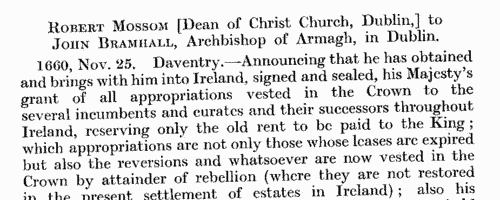
|
Research your ancestry, family history, genealogy and one-name study by direct access to original records and archives indexed by surname.
|









